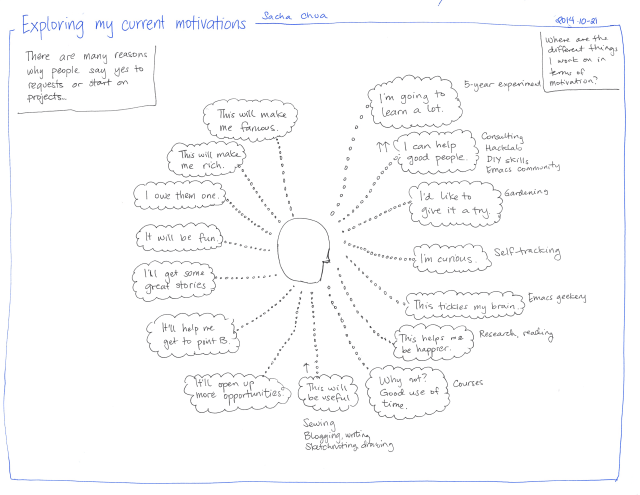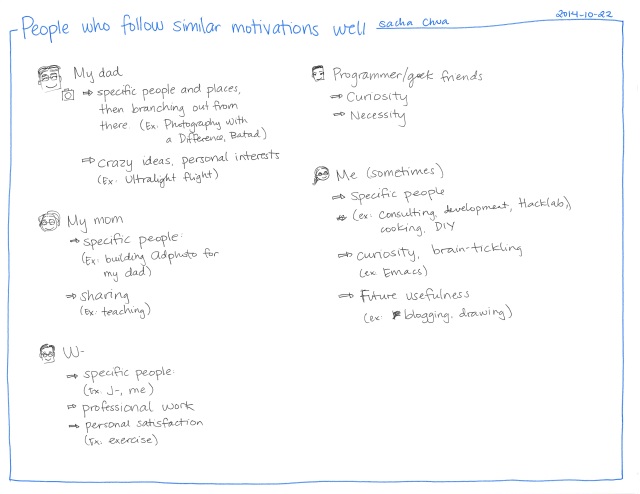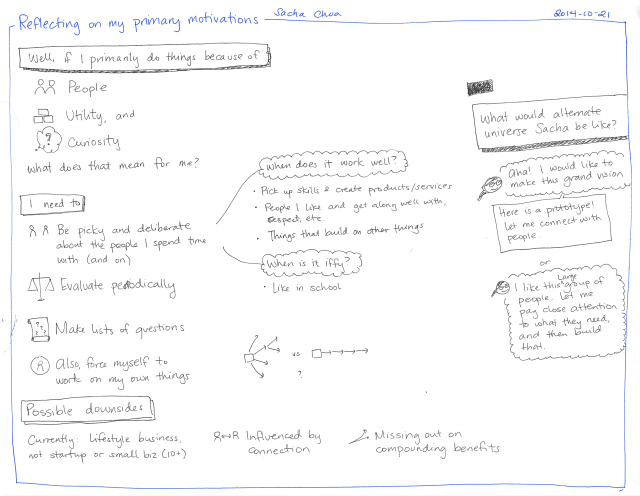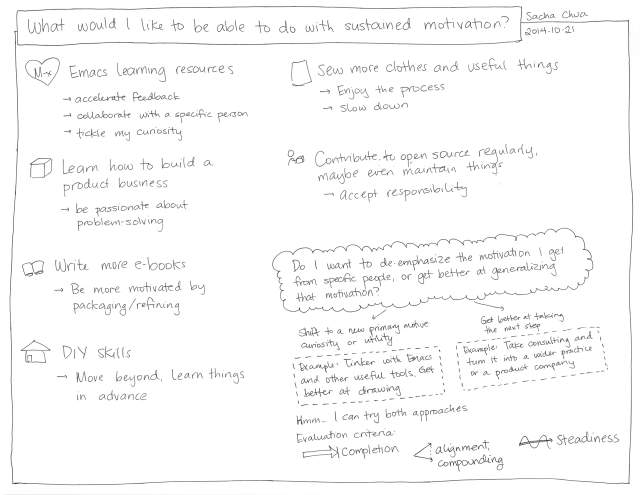Reflecting on motives
| purposeI've been thinking about motives and bigger dreams lately. I have a good foundation for experiments, and I probably should be building something bigger on top of it. But I don't resonate with the entrepreneurial stories of passion and focus. I don't start with a vision of how the world should be and then work backwards from there in order to make it reality. I don't dream of dollars or media mentions when starting an experiment. So if those aren't the things that get me going, what does?
A couple of recent decisions are helping me learn more about my motives. Over dinner, one of the Hacklab board members asked me if I would consider helping with bookkeeping, since the current volunteer was struggling with some of the work. After some deliberation, I agreed to help out. I noticed that my reasons for doing so were primarily because I felt Hacklab board had good people in it, and that solid financial information could help us navigate this somewhat precarious period.
On another note, I'm wrapping up the consulting engagement I've been working on for the past two and a half years. I said yes to that primarily because the person who asked me had good karma. He had helped me get into and make the most of IBM, so I wanted to help him and his team as well.
These two decisions helped me realize how strongly I'm motivated by helping specific people, versus being motivated by a grand vision, the desire to help a general class of people, or other reasons. I hadn't realized the extent before, but now that I look closely, I can see how it plays out. I like prototyping because I can quickly build things with lots of feedback from people who will actually be using the tools. I like automation because I can save specific people time and effort. I like helping people with Emacs because of the individual quirks of their workflows.
I do have other motives, too. Sometimes I do things out of curiosity and because they tickle my brain. Tracking data and tweaking Emacs for myself belong to this category. Sometimes I do things because I think they will be useful, like writing and drawing.
I feel like I have small-m motives rather than the big-M Motives you read about in the biographies of people who change the world. I like working on a small, personal scale. Does that mean I should just focus on small dreams, gradually growing them in size? Are these motives something I can tinker with, work around, or transform into even better strengths?
Fortunately, I can look around me for role models living good lives following similar motivations. My parents also seem highly motivated by helping specific people. For example, my dad wanted to help one boy with autism who was interested in photography. That grew into a large initiative called Photography with a Difference. He's also motivated by curiosity and crazy ideas, like the way he decided to go on a cross-country ultralight flight. My mom was once asked about passion and work. She replied, “John's passion is photography. My passion is John.” She focused on building an advertising photography business so that my dad could do amazing things behind the camera. W- seems motivated by helping specific people, too, and he also focuses on doing things well. Many of my friends who are into programming are into it because of curiosity and the joy of creation (it helps that it pays the bills, too!). On my best days, I do what I do because I get to help specific people, follow my curiosity, and build resources that might be useful.
So if you can live a good life even with “small-scale” motives like this (compared to, say, the desire to reshape the world), what does that mean for me? How can I make things a little bit better? And–just to play with the idea–what would it be like if I had different motives?
I'm not strongly influenced by everyone, but since I do have that desire to help specific people, I can be deliberate about the people I spend time with and include in this consideration. It works out well if helping people out also helps me build skills and resources. It also works out well if I can expand to a group of good people, so I'm not anchored by only one person. For example, having gotten to know the rest of the team during my consulting gig, I feel like they're also good people I'm happy to help.
I want to balance the people motive, though. This is such a strong pull on my brain, and it's so tempting to work on other people's tasks instead of following my own curiosities or developing my own things. I can de-emphasize this by being selective about the tasks I take on, picking the things that are best-aligned to what I want to learn or do anyway. I can also carve off time for self-directed interests, since I'll probably benefit from training myself to get even better at following curiosity and making things I can build on later.
It would probably be very difficult to swap out my motives, going from concrete to abstract, even if it would theoretically be interesting to do so. Ah well. I'll start by working with what I have, but it might be interesting to see if I can experiment with being an Alternate Universe Sacha just in case I discover I actually like it.
Anyway, what kinds of things do I want to be able to do with slightly tweaked motives?
I think it would be interesting to play around with Emacs, open source, and other tools, getting the hang of building more resources. It would probably be good to be able to fully enjoy DIY skills (including sewing) and other things that are good for me, like exercise. If I can notice things about these activities that line up with the things that currently motivate me — or tweak my motivations so that I like more of the things that are good for me — maybe that will make this stuff easier to do and easier to stick with.
Hmm…





